Zeinab Masri | Hassan Ibrahim | Muhannad Hammoud
Northern and eastern Aleppo countryside residents went to streets denouncing unfair electricity pricing mechanisms and deals tainted by corruption between power companies and local governing councils.
In their protests, the demonstrators accused the companies and local councils of lacking transparency, coordination, and complicity due to common utilitarian interests.
The sit-ins, which attempts to curb them failed, revealed defective and weak knowledge and coordination in the local councils’ contracts with the electricity companies, as well as the inability of the councils to monitor the work of the electricity companies amid calls to file lawsuits or terminate contracts and announce the resignations of senior employees of those companies or councils in some times.
The reactions of the local councils and the delay in responding to the demands of the people, and the absence of clarifications, opened the door wide to many questions about who runs the electricity companies and who controls them, what their subordination is, and why adequate explanations were absent from the local councils.
Enab Baladi tries in this investigative article to trace the reasons that led to the inability of the local councils in the countryside of Aleppo to surveil power companies and ascertain their ownership and who manages the Turkey-licensed firms, also, what is the core of contracts and why accusations of corruption chase this vital sector.
Electricity uncovers relations between local councils and companies
The protests began in December 2021 in the countryside of Aleppo, which is under the control of the opposition’s Syrian Interim Government (SIG), but the anger was against local councils, which are directly supported by the Turkish government.
The popular anger was in response to the electricity companies raising the price of domestic, commercial, and industrial consumption under the pretext of the increase in electricity rates from the Turkish supplier, to raise the ceiling of the people’s demands after the power was cut on the pretext of maintenance and rationing, to the rejection of the policy of companies and local councils.
Demonstrations were repeated on a daily basis, concentrated in public squares and in front of local councils and electricity companies, to turn into “revolutionary tents,” night demonstrations, and entry to the headquarters of electricity companies, with promises of escalation.
Some voices accused the local councils and electricity companies of corruption, conspiring against the people, and coordinating among them to obtain more profits amid the councils and companies’ confusion and divergence of decisions.
The people demanded that local councils and companies reduce the price of electricity and that the council abide by the contract with the company in which the price of a kilowatt was set under the contract at 85 Turkish kuruş for domestic consumption, not to cut off the electricity, and to provide explanations for any technical malfunction.
Lack of transparency and institutional work
The response of the councils and electricity companies to the protests revealed the absence of a clear pricing mechanism and a lack of transparency, as companies do not provide the usual official declarations and statements in the business and economic investment sector, especially what affects public affairs, and the appropriate and necessary means of communication with the people are not available.
The companies blamed the Turkish supplier for raising the price and cutting the power for hours after the demonstrations, under the pretext of maintenance and rationing, which was reflected in the street movement, as people were used to having electricity 24 hours a day.
With the protests continuing for three months, adequate explanatory reports for companies were absent, especially the two main licensed electricity suppliers in Turkey, “Ak Energy” and “Syrian-Turkish” (STE).
The service quality has deteriorated amid a hike in malfunctions and outages. It was not the usual level in the companies’ standards. Most of its activities were limited to publications about development, meetings, or managers providing statements about the reasons for raising prices without providing a proper explanation that meets the people’s demands.
The companies also changed prices several times in conjunction with the demonstrations, and prices varied in different regions, which opened the door to speculation in front of the many accusations against the companies, the most important of which are monopoly, corruption, and profiteering. The demonstrators dubbed the power companies “Dracula of the North” to refer to its greed and gluttonously in the region.
At the beginning of the demonstrations, the companies announced that they had suspended the decision to raise prices until coordination and cooperation with local councils took place, and prices were slightly reduced, and many meetings were held, but the new prices were not satisfactory to the people.

The building of the AK Energy Electricity Company in the city of Azaz, northern Syria – 5 August 2021 (Enab Baladi/Walid Othman)
The confusion of the councils makes matters worse
The decisions of the local councils in the countryside of Aleppo regarding the electricity demonstrations varied, some of them denied cooperation and coordination with companies, and some promised to stand by the people by filing a lawsuit against the company or waiving the profit margin available to them.
However, these various decisions have deepened the rift and exacerbated the problem, according to what Enab Baladi monitored.
Ahmed al-Mohammed, head of the media office in the town’s local council, told Enab Baladi that the reasons for the gap and rift between the Electricity Company and the local council in the city are the company’s doubling of the kilowatt price.
The local council in the town of Marea issued a statement on 30 January, accusing the electricity company of violating the agreement and raising the price without coordination with the council, stressing its support for the demands of the people in the city.
The council also announced that it would take legal measures to compel the Electricity Company to respect the contract terms. A few days later, some council members in Marea announced their resignation, following accusations against them from the area’s residents against the background of raising electricity prices.
The local council in the town of Bazza, in the eastern countryside of Aleppo, filed a lawsuit against the electricity company operating in the city due to the power cut on the pretext of rationing, delays in installing meters for subscribers, and the absence of new subscriptions.
The council demanded that legal measures be taken against the company as a result of what it described as violations, according to the statement.
As for the local council in the border city of Azaz, on 28 December, it rejected the Electricity Company’s decision to limit household consumption to 300 kilowatts per month at the price of 1 Turkish lira, and when exceeding 300 kilowatts per month, one kilowatt is calculated at 1.5 lira.
The council also urged subscribers to review the electricity company to recover the amount of 40 USD, the value of the electric meter device that the company took from each subscriber who submitted his subscription, starting from the date of 1 December 2021.
On 10 January, the council announced that its share of the electricity company’s profits is about 4 percent, and its revenues from the company do not exceed 40,000 TL per month, while the council pays for drawing electricity in the roads, mosques, bakeries, and utilities affiliated to it fees of up to 100,000 TL per month.
The local council in Souran issued a statement in which it clarified that the electricity company violated the agreement and raised the price of electricity without coordination with the council.
Last January, through an audio recording, the head of the council in Souran said that the council had waived the council’s percentage of profits after meeting with the electricity companies and local councils in the area.
The in-charge of the media office in the local council of the town of Souran indicated to Enab Baladi that the local council in Souran has taken several steps, including issuing a decision to cancel the amount of 20 TL, which it was receiving per month under the name of service fees (water and cleaning), and the electricity company was the one who collected these fees from locals while charging electricity cards.
The Souran council seeks to reduce the price of electricity, to match the average per capita income in the region, and the council also dispensed with a percentage of the electricity company’s revenues that were allocated to it; the media office said.
Unsatisfactory contracts
Different decisions taken by local councils were accompanied by the emergence of contracts with different prices from one region to another between companies and councils.
On 12 January, the Syrian-Turkish Electric Energy Company (STE) set the price of electricity for subscribers in the city of Afrin and its countryside in the regions of Rajo, Jandares, Maabatli, Sharran, and Sheikh al-Hadid.
The price of electricity for the first segment of citizens, which includes residential subscribers who use 100 kilowatts per month or less, is 1.15 TL per kilowatt.
The price for the second bracket, which includes residential subscribers who use more than 100 kilowatts per month, is 2.30 TL per kilowatt.
The third tranche includes commercial and industrial subscribers, and the price of electricity is 2.50 TL per kilowatt.
The Electricity Company Ak Energy announced, on 11 February, setting the price of a domestic kilowatt at 1.85 TL, and the value of the commercial and industrial segment at 3 TL per kilowatt in towns of Azaz, al-Bab, Jarablus, and Ghandoura.
The agreement came after fighters in the Northern Storm Brigade of the Syrian National Army (SNA) closed the electricity company building in the city of Azaz. The closure came after the work of the company’s employees was suspended, on 10 February.
The reason for the closure is the failure of the electricity company to respond to warnings addressed to it by the city’s local council.
The various companies’ contracts deepened the problem from one region to another, led to the escalation of demonstrations, accusations, and anti-voices, and received more severe reactions from the people.
The people considered that these contracts created a kind of division between the areas in northern Syria, showing disinterest by power companies and local councils towards the people’s demands.
The Chamber of Commerce and Industry in the city of al-Bab considered that the decisions of Ak Energy regarding the new pricing of industrial and commercial electricity were “unfair and unjust.”
A statement issued by the Chamber on 12 February said that the new pricing negatively affects the industrial and commercial reality in the region, and this would cause a new wave of prices for goods.
The Chamber of Commerce and Industry, through repeated meetings with the company, and in the presence of many traders and industrialists, found that the Electricity Company did not take into account the repeated demands of traders and industrialists, starting from reducing the price, to providing services and facilities for them, according to the statement.
Who manages STE and Ak Energy?
Two power suppliers monopolize Aleppo countryside
Since the Syrian opposition factions took control of northern Syria, the regime’s government has stopped supplying the region with electricity and other services, which prompted the residents to search for alternatives, including subscribing to generators, owning private power generators, or adopting batteries and resorting to solar panels, until the electricity supply returned to the region from the Turkish neighbor.
The electricity sector in the northern and eastern countryside of Aleppo witnessed the entry of investment companies, with contracts signed with the local councils that control the countryside with Turkish support, to deliver electricity to the area since the beginning of 2018.
In 2019, the Al-Shamal (The North) company operating in Marea signed a contract with the local council in the town to purchase all the electrical station equipment with the aim of delivering electricity to it.
In April of the same year, the Syrian-Turkish Electricity Company (STE) entered the northern countryside of Aleppo with an investment contract to deliver electricity to the town of Souran and neighboring villages.
In 2018, the city of Azaz witnessed a project to deliver electricity between the local council and Ak Energy company to supply the city with a capacity of 30 megawatts, in return for providing the land and raw materials needed to proceed with the project.
Ak Energy Company
The company is the first in the region to have all the licenses to generate electric power, distribute, and supply it to subscribers in the regions of northern Syria, according to the license granted to it by the Turkish government and local councils, according to the company’s website.
The company started its business on 1 June 2017, according to the license number “9123455” granted by the Chamber of Industry and Commerce in the Turkish state of Gaziantep.
It considers itself “a pioneer in first-class energy projects between Syria and Turkey, which has doubled its influence on an annual basis since its establishment until now, with the number of its employees increasing accordingly.”
According to its Facebook page, the company is a private Turkish company, licensed in accordance with the Turkish Labor Law, and works in the field of electric power generation and distribution. The company supplies electricity to the areas of Azaz, al-Bab, al-Ra’i, Bza’a, Qabasin, Jarablus, and Tal Abyad.
To find out the details of the company’s ownership and nationality, the details of Syrians’ investment in it, and the share of local councils operating in northern Syria, Enab Baladi has reached the company’s media office, but it apologized and refused to give any answer.
The company’s website ends with the suffix “com.tr”, which confirms the registration of the company’s data in Turkey, and by searching for the “domain,” it is found that the company is registered in the Turkish state of Kilis in the south of the country.
A search on the Federation of Chambers and Commodity Exchanges of Turkey website for AK Energy shows its full name “AK ENERGY ELEKTRİK ENERJİSİ TEDARİK TOPTAN SATIŞ LİMİTED ŞİRKETİ,” and confirms its registration in Kilis with the registration number “4599”, but the company’s website shows that its location is in Gaziantep, Turkey.
The company that supplies electricity to northern Syria differs from the Turkish company “AKENERJİ,” which started its activities as an automated production group in the “Akkök” group of companies in 1989 and continues its presence in the sector as an independent electricity generation company since 2005, but it bears a similar name to the Turkish company.
Who owns Ak Energy?
The company’s ownership is divided between four people: Khalil Mhimd İbrahim owns 31 percent of the company’s shares, Hasan Tatar owns 25 percent, Recep Çoban owns 20 percent, and Yasin Yücel owns 24 percent, according to a report by the Turkish Paramevzu website, which was published on 8 February.
The report did not mention the nationalities of the company’s owners, which was founded in Kilis in 2018, but indicates that its current capital is two million Turkish liras.
According to the report, the recent protests in northern Syria over the power cut faced the Turkish “AKENERJİ” company, with a company operating under a commercial name very close to its name in the region.
The Turkish company (AKENERJİ) has authorized the “Public Disclosure Platform” (KAP), which is an electronic system through which notifications required to be disclosed to the public are sent, in accordance with money and exchange market legislation and announced to the public by electronic signature that it does not have any activity in the region and there is no relation with the company operating in northern Syria.
The Turkish company also filed legal procedures against the company operating in northern Syria, with a request to issue a temporary court order to detect and prevent using its trademark and unfair competition, demanding the deletion of the trade name registration and preventing the transfer of ownership to third parties.
The company has an energy supply license, “Tedarik Lisansı,” according to the Turkish Energy Market Regulatory Authority (EPDK).
The Turkish “Enerjigunlugu” website reported on 11 July 2019 that KAP granted Ak Energy a supply license for 20 years.
In September 2021, the company operating in northern Syria submitted a request to the authority to amend a license to allocate a maximum capacity of 60 megawatts in order to export electric power to Syria, according to what the EPDK announced on its official website.
The statement of the EPDK said the company can apply to the authority until 11 October, according to the procedures required by the provisions of the relevant legislation, in order to export electric power to Syria, using the current connection line between the Elbeli area in Kilis in Turkey and Chopan Bay (Al-Ra’i) in Syria.
The Syrian-Turkish Electric Energy Company (STE)
It is a Syrian-Turkish company working in the field of supplying electric power from the Turkish state to the safe zone in the liberated north of Syria. Work began regularly by signing a contract with the local council of Souran on 6 April 2019, according to the company’s identification on its website.
Previously, the company’s work was based on amperes (the name locals use to refer to generators’ electricity). At that time, the price of a kilowatt amounted to 85 Turkish kuruş, and the subscriber was paying 400 Turkish liras as an initial guarantee amount, and he had the option to pay it either in full or in installments (100 Turkish liras per month).
The company supplies the areas of Afrin and its countryside, Souran, and Akhtarin with electricity, targeting the domestic, commercial, and industrial segments.
Those in charge of the company are businessmen and owners of digital companies and contracting companies, including Muayyad Ali Hamidi, Dia Mustafa Kaddour, and Mahmoud Ahmed Kaddour.
STE is an abbreviation of the full name of the company (STE Elektrik Enerjisi Tedarik Toptan Satış İthalat İhracat Limited Şirketi) and means “Wholesale Electric Power Supply Company, Import and Export Limited.”
The company owns an energy supply license “Tedarik Lisansı,” and it exports electricity to the north of Syria by feeding the area through the electricity transmission line between the city of Reyhanli in the state of Hatay in southern Turkey and the city of Afrin, in the north of Aleppo province.
A statement by the Turkish Energy Market Regulatory Authority (EPDK) on 16 July 2021 stated that the STE company submitted a request to increase the electricity exported to Syria from 20 megawatts to 30 megawatts.
According to the Turkish “Enerjigunlugu” website, on 15 December 2019, EPDK granted STE a supply license for 20 years.
To find out the details of the nationality of the STE company and its owners, Enab Baladi contacted the company’s media office, which in turn confirmed that the company is a Syrian-Turkish company operating under an investment contract for ten years.
The media office said that the company is committed to the contracts signed with the local councils operating in the north of Syria and all the attachments regarding the denial of some local councils’ coordination with the company regarding raising prices.
The media office said that the company receives complaints through social media, stressing that there is coordination between all sectors and workshops.
Al Shamal Company
There is no adequate information available about the Al-Shamal company operating in northern Syria, but its Facebook page defines it as an electric power distribution company, whose name in Turkish is “Al Şamal Elektrik Şirketi.”
The company supplies the city of Marea with electricity, and on 6 February 2021, it signed a cooperation protocol with the Ak Energy company and accordingly reduced the price of electricity per kilowatt to 86 Turkish kuruş at the time, according to its Facebook account.
Enab Baladi tried to contact the company through a phone number posted on its Facebook page without getting a response. After that, a message was sent to the same number, and Enab Baladi received a response from a person saying that he was busy for a special occasion and that he would respond later. He did not call back. The company’s website is not available.
Residents’ judgment on the dispute
Confronting monopolistic companies and weak local councils
The two main electricity companies’ decisions and the continuous price hikes did not pass without a popular reaction, as protests swept al-Bab, Azaz, Marea, Souran, and other cities and towns in the northern and eastern countryside of Aleppo.
Monopolistic company is first responsible
Some of the residents of al-Bab, whose opinions Enab Baladi surveyed, held the “monopolistic” electricity company responsible, and the local council, which proved weak in its representation of citizens when negotiating with the company.
Moataz Nasser, a blogger from the city of Aleppo, told Enab Baladi that the problem already exists in the method of contracting with the electricity company, as an unelected council contracted with it through tenders and unannounced contracts, which allowed it to monopolize the energy sector, and it also violated the promises it had made.
Naim Loman from al-Bab city also considered that the cause of the problem is the presence of a single monopoly company that is the sole controller of the electricity file, with the absence of a real investment competitor for this company.
As for Ahmed al-Jabali, he held the responsibility of the former local council in the town, which, according to his description, “handed over their necks” to the monopoly company.
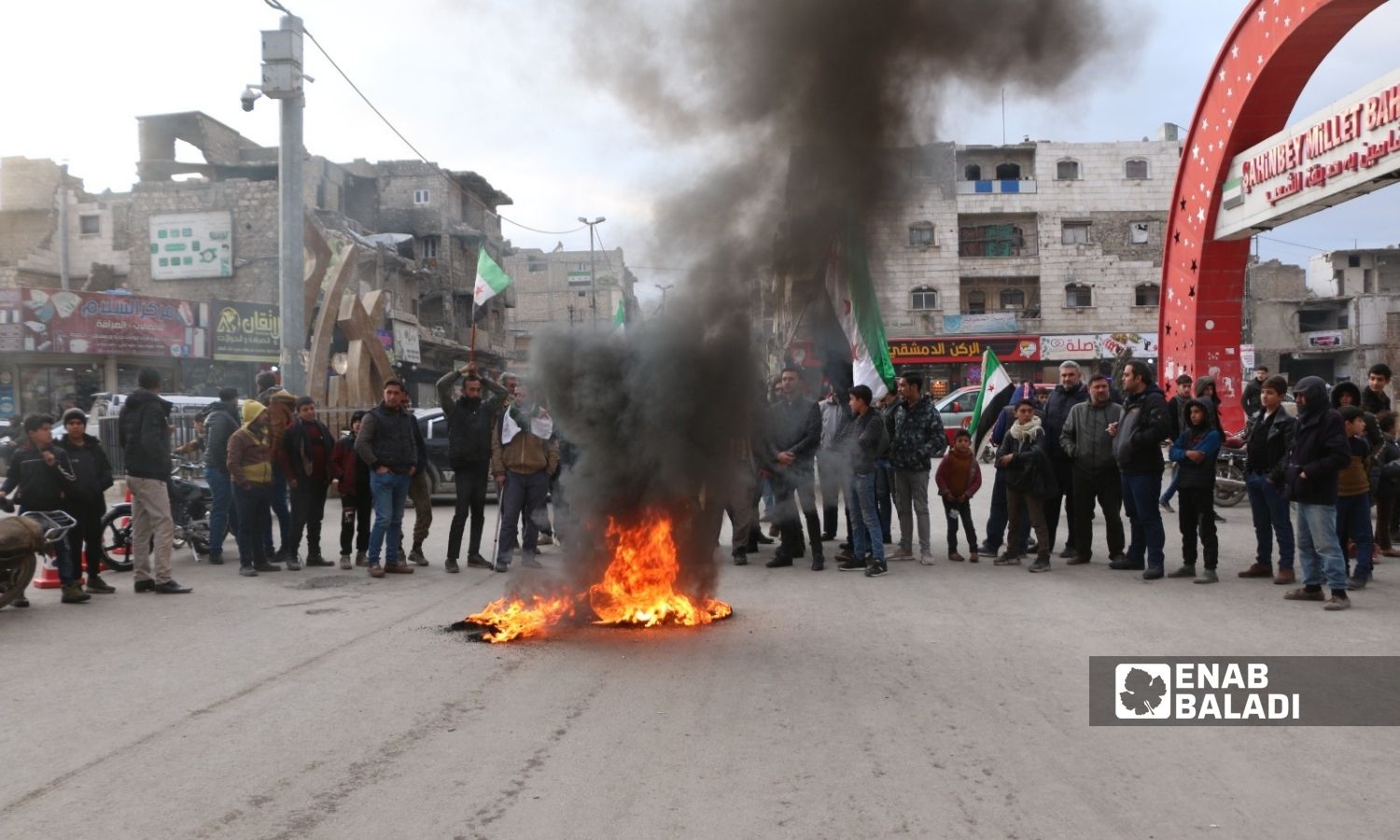
A demonstration in front of the Center roundabout in the city of al-Bab in the eastern countryside of Aleppo, 5 January 2022 (Enab Baladi / Siraj Muhammad)
Problems beyond high prices… Al-Bab as model
The suffering of the residents of al-Bab city with the Electricity Company was not limited to the continuous high prices of its services, which are not suitable for income. Rather, it went beyond them to security and living problems caused by the continuous electricity cuts in the city, and the company turned into “a cluster of overlapping and complex problems,” as Nasser described it.
The monthly electricity bill in al-Bab city exceeds more than 30-40 percent of the citizen’s income, which averages 60 USD.
Firas Saraqibi, one of the displaced people from Hama who resides in the city of al-Bab, complained about the rationing. He told Enab Baladi that the constant electricity cuts cause spoilage of the food they store in the summer for consumption in the winter.
Low voltage also causes household electrical appliances to malfunction, according to al-Jabali, who suffered from frequent breakdowns of his washing machine in his home.
The continuous power cuts worsen the security situation in the city. As soon as the electricity is cut off, assassinations, kidnappings, lootings, and theft of homes and shops increase, according to what citizen Mohammed Abdulatif told Enab Baladi.
Residents’ demands
The people interviewed by Enab Baladi demanded that the electricity company reduce its profits and set reasonable prices in line with the citizen’s income.
Loman talked about the destroyed infrastructure of the electrical network and the interruptions caused by damage to the towers, calling on the company to repair the network and to abolish the idea of rationing completely.
Al-Jabali also said that the company should improve its services and be a real electricity company, not a “shop,” describing it as a “failed company” in the nature of its service, the interruptions, the rationing, and the electric voltage supplied.
As for Nasser, he believes that the solution is to replace the company and file a lawsuit against it for violating the “monopolistic” contracts, even though it is in its interest, as he said.
He also called for the dissolution of the local council in the city of al-Bab, and the establishment of elections through which people can choose who represents them in the councils, with clear mechanisms for transparency and monitoring of the work of these councils.
They also demanded that the subordination of the councils be “national subordination” within the administrative hierarchy of the Syrian Interim Government, with complete dispensation of external dependencies.
The rest of the citizens who spoke to Enab Baladi agreed that the local council is weak and unassuming, affiliated with the company, and cannot force it to abide by its promises, demanding that it be a true representative of the people, negotiating and protecting it from what they described as the company’s “greed.”
Saraqibi says that the Interim Government should take over the electricity sector and distribute it to councils, as its position is stronger in negotiating and obligating the company to contracts, in contrast to the weak local council that is unable to do so.
Protests, the last choice
The people of al-Bab have no options other than to demonstrate and sit in, especially after attempts and meetings that brought them together with the local council to change decisions, but without any results.
Blogger Moataz Nasser said that after the recent protests, young people and activists volunteered to convey the people’s demands to the local council and the electricity company, but the result so far is nothing but “false” and useless promises.
The people continue their non-violent movement, but they cannot control all citizens and all segments of society, as there may be, according to him, segments that do not believe in the non-violent movement and take more “creative and cruel” methods that affect the profitability of the company, Nasser added.
In his turn, Loman warned that the electricity problem is a general problem that affects all residents, which means that there is no plan and that the residents’ gathering is an unorganized rally, and its next steps cannot be predicted, hoping that things will be resolved before they get out of control.
Al-Jabali said that people are enraged, expecting the situation to escalate in the coming days against the power company.
if you think the article contain wrong information or you have additional details Send Correction
النسخة العربية من المقال
-
Follow us :












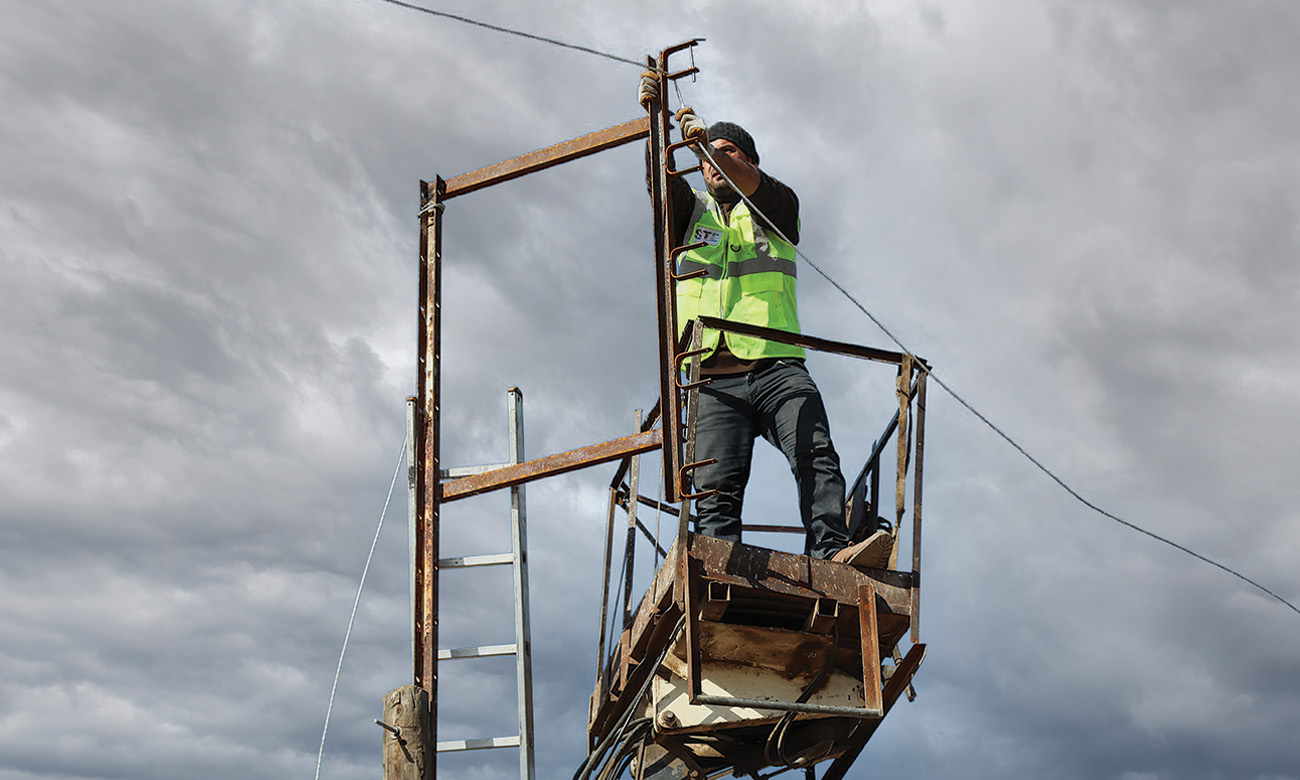
 A worker at the Syrian-Turkish Electricity Company (STE) rehabilitating a power line in Afrin city
A worker at the Syrian-Turkish Electricity Company (STE) rehabilitating a power line in Afrin city





 A
A
A
A
A
A
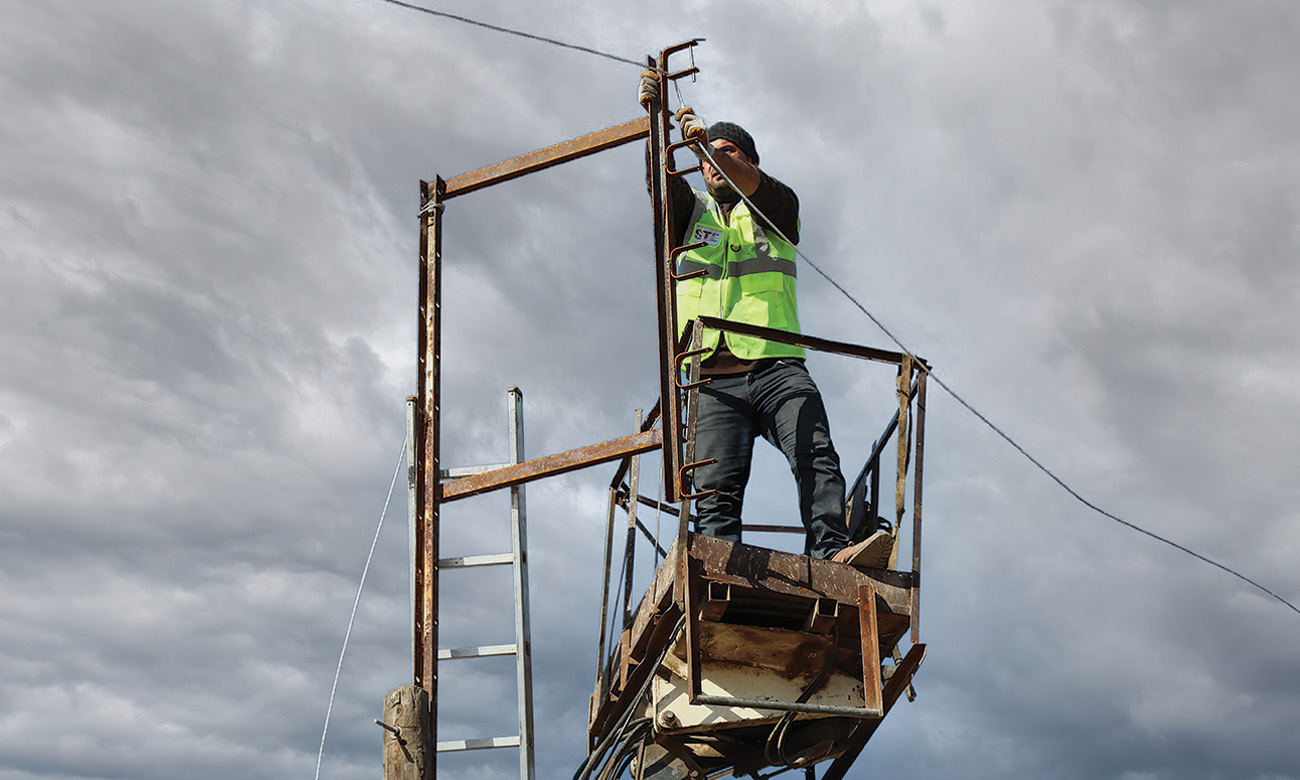
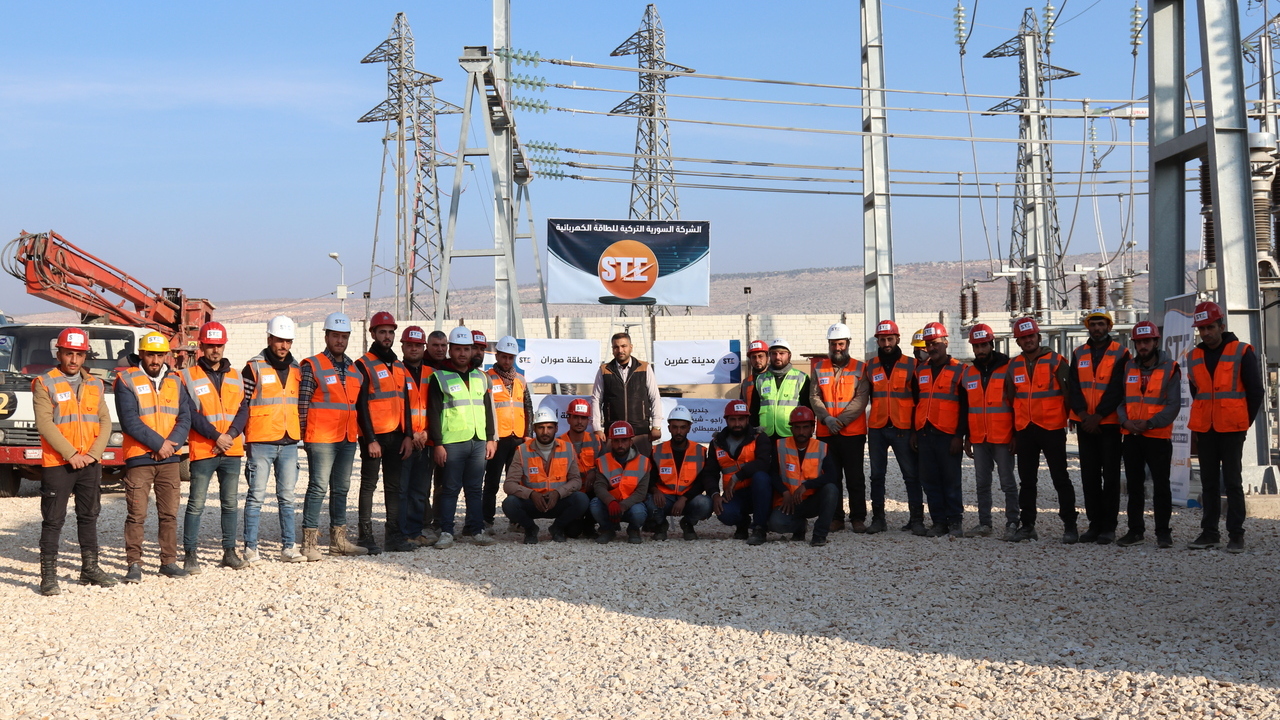
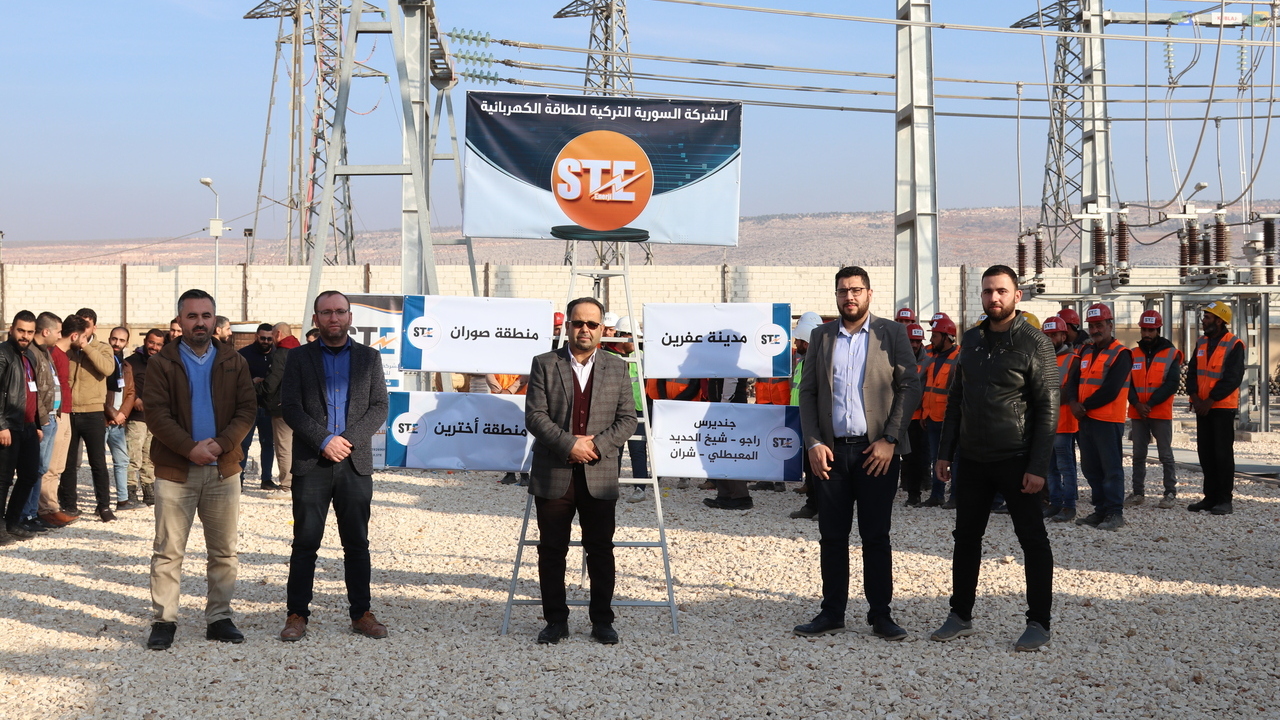







 More In-Depth
More In-Depth